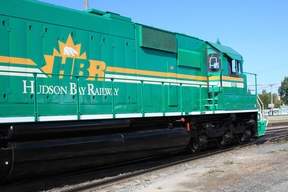OmniTRAX shelves plans to ship crude oil through Northern Manitoba
Thompson Citizen

Plans to ship crude oil by rail from The Pas to Churchill have been shelved indefinitely, OmniTrax Canada president Merv Tweed announced in an Aug. 15 press release.
“OmniTRAX's vision has always been to run a viable business that meets the needs of Northern Manitoba and indeed northern Canada,” said Tweed. “Our decision to suspend crude by rail was based in part that grain shippers were willing to commit long-term orders in contracts of over 700,000 metric tonnes due to the market's overall growth. Following last year's record crop, we're preparing for another strong shipping season.”
Tweed had said in June that a planned test shipment of crude oil that the company had mused about transporting this year was not likely to happen.
Tweed said consultations with First Nations, Metis and the provincial government were factors in its decision to suspend plans to ship crude oil via Hudson Bay, though OmniTRAX still hopes to diversify the products it ships to include potash, feed and wood pellets in the interest of long-term sustainability.
“After reviewing our current business operations, we are also developing a long-term sustainability strategy that will make policy recommendations to the provincial and federal governments, as well as identifying critical infrastructure investments required to continue the development of the Northern Gateway trade corridor,” said Tweed.
Eric Reder, Manitoba campaign director for the Wilderness Committee, an environmental organization that opposed shipping crude oil along OmniTRAX's Hudson Bay Railway, said OmniTRAX's decision was a win for Churchill and the environment as a whole in a press release on the Wilderness Committee's website.
“The Wilderness Committee laid out the risks and concerns with this preposterous plan, and then our members and supporters made sure the governments knew this was a terrible idea,” said Reder. “Thousands of Manitobans signed letters to both the federal and provincial governments to stop this crude plan. People from around the world voiced their objection. Today we are all relieved.”
Noting that a freight train derailed on the Hudson Bay Railway the day before the decision was announced, Reder said opponents were right about the riskiness of the plan.
“We were proven correct about the unsuitability of these train tracks to ship crude oil because of the number of derailments in the past year,” said Reder. “However, every derailment creates hardship for people in Northern Manitoba.
“Outside of the ridiculous idea to send dangerous goods down this rail line, this is a victory in the fight to limit the use of climate-killing fossil fuels,” said Reder. “Every time we stop the installation of new fossil fuel infrastructure, we get closer to a civilization that releases less greenhouse gases, and get closer to stabilizing our climate.”
The Wilderness Committee plans to continue pursuing legislation to ban the shipment of crude oil through Northern Manitoba and Hudson Bay.
OmniTRAX said it anticipates a record shipping season in 2014. The first vessel of the season began loading wheat destined for Mexico on Aug. 5.
Canada's only deep sea Arctic port, the Port of Churchill operates from late July through mid-November shipping grain and other crops, as well as other cargo. OmniTRAX Canada has operated the port as well as the Hudson Bay Railway since 1997, when it bought the Northern Manitoba track from CN for $11 million. It acquired the Port of Churchill, which opened in 1929, from Canada Ports Corporation for a token $10 soon after buying the rail line.


